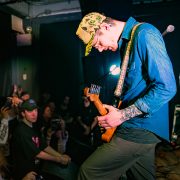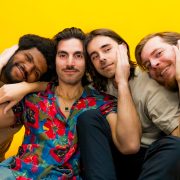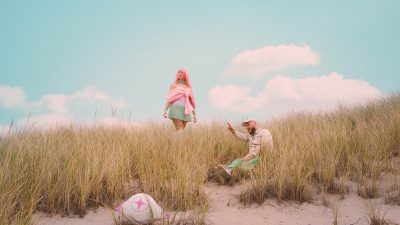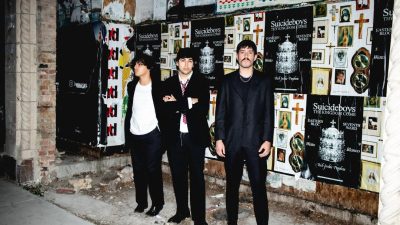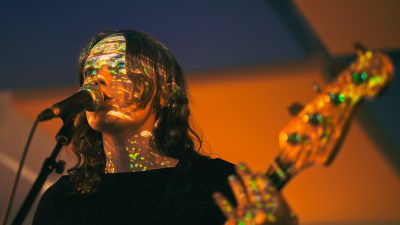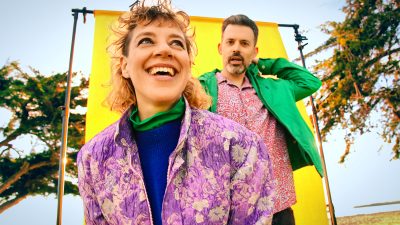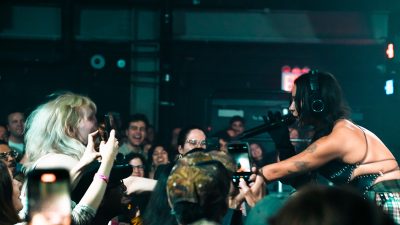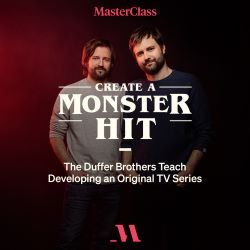Valley Boy gives us a glimpse below the braids in conversation
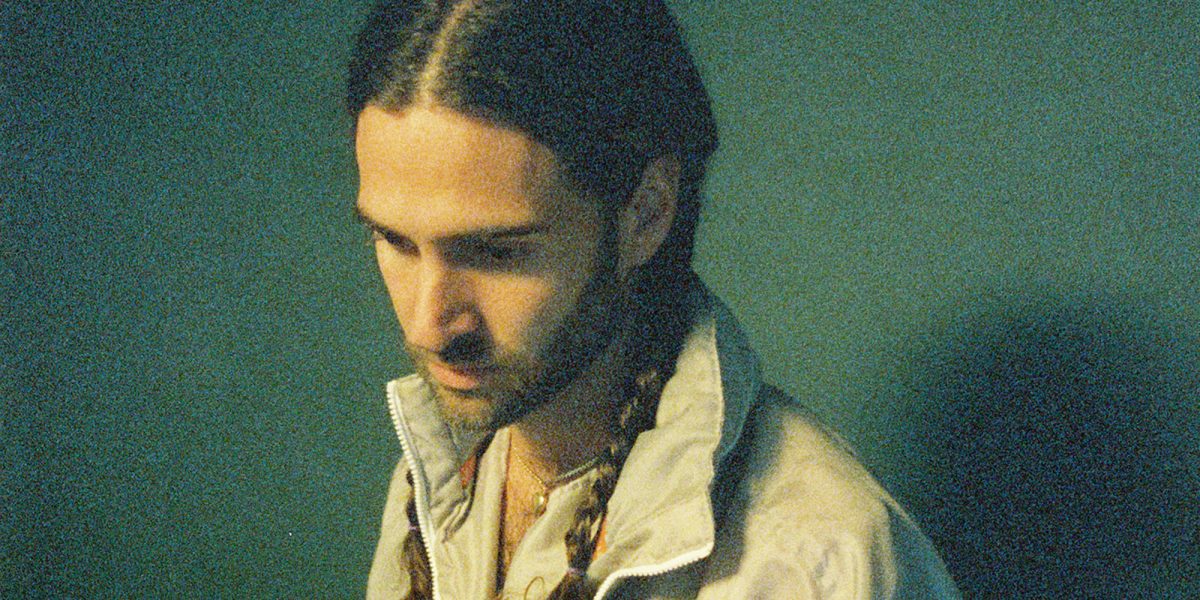
Last week, I sat down virtually with Valley Boy, him over a French Canadian espresso from a cafe near Montreal and me over an energy drink from the office fridge. We spoke about performing live, producing music, and how he mixes those things into his creative process. Read along below.
Valley Boy (James Alan Ghaleb Amaradio): I live for the live side of [music], really. It’s where it makes sense. It’s so hard, I think live, it’s like a living thing. It suddenly becomes like a real moment between you and people. It’s just like the conversation you and I are having right now. You know, this is so engaging to me. And I feel like I get to see you and meet another human. And generally, even on my worst days, I like people.
You know, I might struggle to like myself the most, which is why it’s nice for me to interact with other people. And also, it’s less abstract. I get to give the thing that I spend however many years, weeks, hours doing alone in my room a purpose in real life. You know, it’s not just like going straight to the ether. And honestly, as a musician … there are so many aesthetic choices that happen along the way in producing and recording, it’s such a wealth of options and things that can work and can sound good and I love the limitation of reality and life. I like to push up against that barrier, you know, I like to see how I can bring myself to sing in a special way or how I can push myself and my body and my spirit to another level.
Dude, when I’m producing, every time I say I’m not going to over edit I fucking over edit… Every time I say like, no, no, this one, this recording is going to be really raw. I swear, somehow it ends up with me scooting [knobs and dials] tiny little fucking fractions. And now I have kind of one bad eye. So it’s even harder for me. You see, I’m like, squinting through my one good eye, like a microscope [he laughs] I love avoiding that at all costs. So live is cool. I don’t play to tracks, you know, it’s just me and a guitar.
Eric Mura: I like what you’re saying, because when you’re on the production side, it’s like your own project. How do you ever say it’s done? So you’re continually tinkering, tinkering, tinkering. And when you’re live, that’s not your decision. You’re there with so many people. I really I really felt that, too, with the “Happy All the Time” music video. It seemed like you wanted that to be kind of as close to a live performance as you could get for a music video. Will you talk to me a little about that creative process, and what you were thinking there?
VB: I grew up loving music videos, and they’re beautiful. And if you have a budget or if you’re a fucking editing genius on your own they can be such meaningful pieces of art, but I’m so fucking indie duuuuuuude. I got one pair of pants on this tour, you know, like that’s real for me [laughs]. What I want to give people, the thing that’s most me, is again, the least amount of decisions possible. It’s not about what the fucking set is. It’s not about how the edit works. I wanted to just give people the song as best as I could fucking play it. Live, if given the option, you know? And that’s what we did.
EM: Do you feel like you want to keep doing music videos in that style?
VB: Shit, dude, if I had the budget, that’s the dream. We did a series, because we were strapped, we were like, let’s bang out as many as we can. So we did four videos on that day, just in the same location. There’s a few more that can come out that we’re excited for and I really hope I have the option to do more.
EM: I read a lot about your feeling a connection, spiritually, to Frank Ocean on his pathway. Doing that producing, that songwriting at the beginning and then kind of going on your own journey, now. One of the things I hear kind of distinctly that I think diverges from [Frank’s] path is that connection. I know Frank has a big, I want to call it, social anxiety around his presence with his fans and his performances live. He keeps that very small, very intimate, and doesn’t keep himself very available to the audience. You’re describing a love for that connection to your audience like that, that performance aspect of it. Do you feel that divergence?
VB: Yeah. So Frank is so special and important, you know, not enough people can say it. He broke through this barrier in my head and really woke me up to songwriting in such a way. Like, his craft is just at such a high level and so unique. I mean, there are others who are similarly fantastic, but he was the first one to really crack me open. Before, I loved songs and music, always, but I wasn’t always very lyrical. And I was like, I love fucking Led Zeppelin, dude. I grew out my fucking hair aged 12 and never looked back and was trying to be Robert Plant…But yeah, I kind of diverge from Frank and I think it comes from, I don’t know, also maybe my other hero or heroes, Jeff Buckley and Amy Winehouse, who were just truly such live icons.
That’s where it all clicked for them. Obviously, Amy’s recordings are beautiful. I love every single Jeff Buckley recording as well. I rinse Grace, I rinse fucking, Sketches for my Sweetheart the Drunk, like everything. I guess that’s where the divergence is. If I had the chance, I would take any show. I’d take every show. Because I don’t know why else I’m here. I wasn’t kind of a smart kid. I could have maybe done other more useful things in this world. And I really selfishly hung on to music, so I want to, at least, give it back somehow. Whenever and however I can.
EM: When you perform, do you prefer performing solo? Like you and your instrument, or do you like having a band with you?
VB: If I had the option to have a band with me all the time, that would be really special because that’s like expanding the palette. Because so far I’ve been kind of like, sketched out about using tracks, you know? But yeah, I want to be able to give people a spectrum of sound. And also honestly, I look at the videos of Jeff Buckley or live videos of Amy, and I’m like, I can’t breathe – I’m like watching and waiting for them to take a breath so I can take a breath [laughs], but often those are with the band too, you know?
And that’s, I think, why I wanted to do those live videos with the band. I did one of them totally solo, just to like, do that. But yeah, it would be lovely to have a band, but I do love to be solo too. It’s beautiful to just be able to connect with people, but I take either or whatever. I mean, also, I’m like a fucking pack animal, dude. I love my people…You know, so it’s beautiful that you get to share that with people you love. And for me, I didn’t grow up with a great home life, so my band was like my family, I made my best friends into my band, and my best friends and band became my family.
EM: In that spirit of family, your previous album, which you made with your wife, Honeymooners, obviously has a theme of marriage. This next one, Child of Divorce, also has this theme of marriage in it. And we’re talking now about family and about finding our found family versus the family we have. I’d love to hear a little about family and your thoughts on that family unit, because it seems to be coming across in your writing.
VB: You know, it’s funny, I felt after my last record like it was a concept record written on my honeymoon with my wife. Couldn’t be more about marriage, right? And honestly, it was hard to know when to stop. There are so many other songs we’re probably going to pop out another one. Just ‘cus there’s more to say.
But then now I’m swinging to the other pole and examining what made me and what my family was like, you know. I had a bit of a broken home situation, and it was complicated growing up. And, it’s funny, I think I always wanted my first concept album to be about this. I don’t know why I always had, like, a real clarity about it. Like the first record, the first Valley Boy record is going to be called Children of Divorce, and it’s going to be about this, and I’m going to just take a crack at it.
Growing up, I just started realising, I was almost like a magnet for other children of divorce growing up. l mean, it’s not hard to be [a magnet for other children of divorce] because they’re just like so many of them. And I wanted to tell some stories about it. I just didn’t know why there wasn’t any real focused literature on this thing. I’ve actually read some psychological studies, but I didn’t know why we didn’t just … have someone in music just give it a shot. You know, throw one out, see what happens. And I wanted to!
It’s such a complicated subject and it’s so common that it almost feels really small. And especially as we grow up and look at you and me and you’re like, okay, that was our childhood, you know, of course everybody has a hard childhood. That’s not even the hardest! It’s, “Oh, you’re a child of divorce? You’re lower middle class? So what?” Like you couldn’t be more common and as an adult, we should be really fucking over it. But I think, making [this album], it made me realise we experienced a lot of trauma as kids, but it doesn’t mean we’ve processed it. And, it’s okay that even these things that might feel small in the face of other people’s issues, which they could be, I mean, as experience, it’s really subjective. And for me, what I found anecdotally was that a lot of other children of divorce, this is still a pretty huge event. It shakes you, changes you, and it’s not to say that people shouldn’t get divorced. It was just kind of like, I really wanted to speak on my experience a little.
As difficult as it was for me to even make sense of it and try to bring other people into it, like my own brother, who is my half-brother. His dad was an addict. My mom divorced his dad before she married my dad, and then my dad, fucking left, than my dad’s dad got cheated and got a divorce from his wife and a best friend whose fucking his mom cheated on his dad and got a divorce and all the ripple effects of, like, the interesting instabilities and the things that we have to overcome to be functional people after that, like, fractures in our lives. So family and it was funny, I felt so fucking Freudian writing about parents like quite a lot [laughs]. Like, “Oh, geez, this has no love songs” [laughs]. What cafe is going to play this shit, I’m actually in a coffee shop right now, which is lovely. I love coffee shops, and every time I walk into a coffee shop, I’m like, oh god, I mean, what playlist am I on?
EM: [Laughs] It sounds to me like what you’re saying is that people, a lot of the time, tell themselves everybody gets divorced. Why should I let this affect me? You’re saying no, this is not normal. You should feel sad. It’s okay, and so I feel like that’s a hopeful message. All you’re doing is acknowledging the reality of what’s going on, but it sounds like there’s a hopefulness in it. Do you feel that way as well, or is it more emotional?
VB: It’s both. But I think it is hopeful. I mean, it’s so funny. While I was growing up, really because my home was so sad, I had an aversion to consuming any art that had sadness or pain.
I think people who have gone through it, like it might be common to not seek it out because it’s like I already have enough of that in my reality, you know? I’d rather fucking sit down with some high fantasy and read about orcs or some shit…so many hours of watching silly TV shows next to my mom just quietly, silently, that was how we were trying to cope with things. So this album, it’s got heaviness and there’s loss in it…I keep going back to other concept albums that I love and being like, oh my God, I just didn’t mean, like, how do they fucking do it? And I keep trying to figure out how to slide the puzzle pieces together to make sense of it, is my narrative linear or non-linear, but really, I think it is an act of healing to recognise where you’re hurt and name it and let it have its moment. And, whether or not I button it all up at the end of the album, I have a song that buttons it all up, and I can’t decide if it’s like the director’s cut or if it’s like the theatrical version right now.
* * *
Valley Boy’s Debut album is out in September.
Cover photo by Natalie Hewitt


